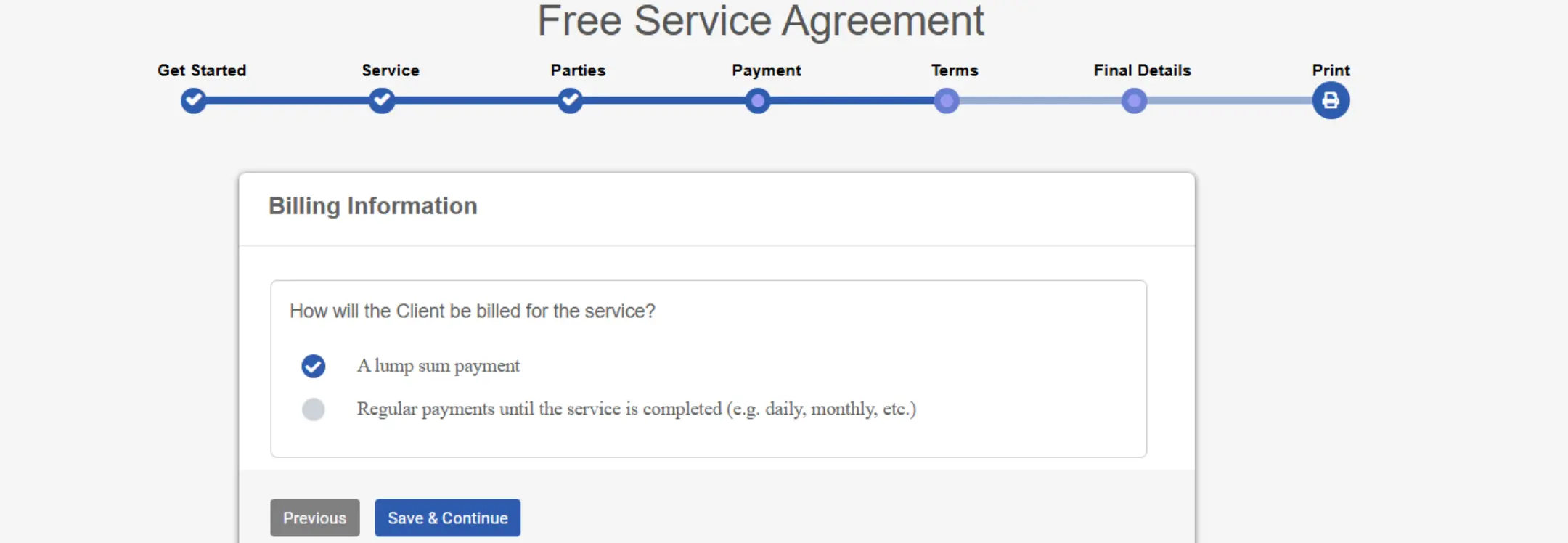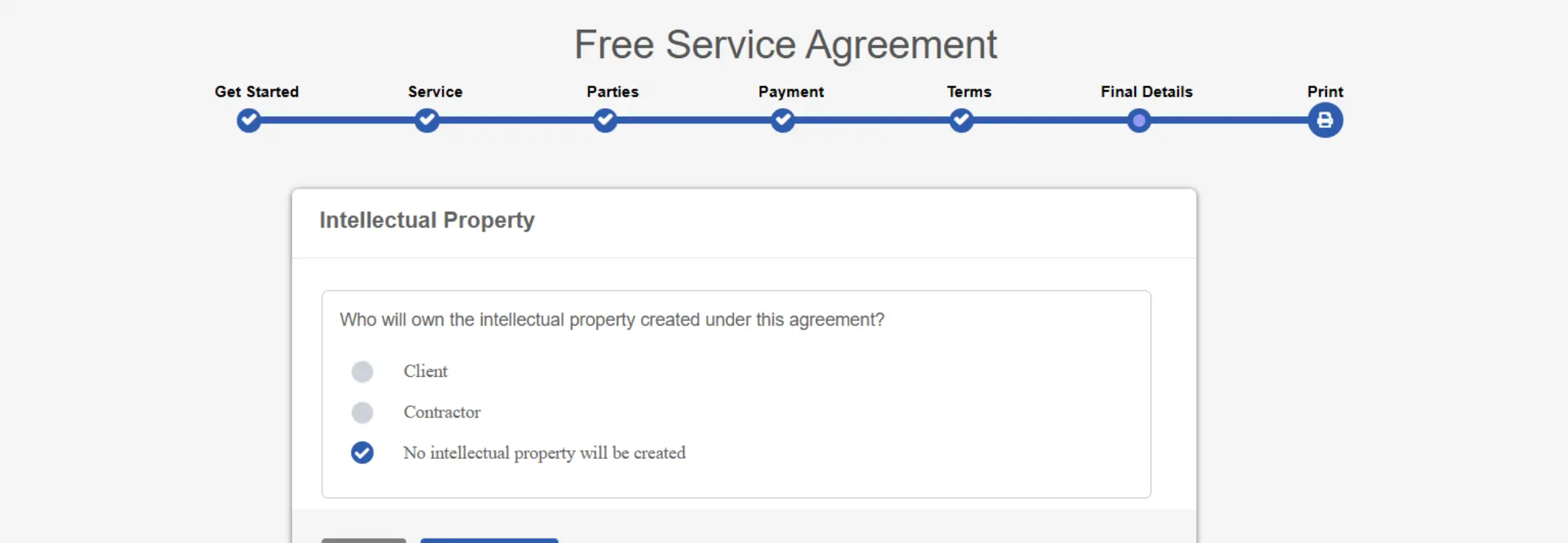TL;DR- A service agreement is a legally binding contract between service providers and clients that defines work scope, payment terms, and obligations to prevent disputes
- Common types include general service agreements, consulting agreements, freelancer contracts, maintenance agreements, and retainer arrangements
- Essential elements cover party details, service scope, payment terms, confidentiality clauses, intellectual property rights, and termination conditions
- Written agreements protect both providers and clients through clear expectations, legal recourse, and professional accountability
- Ziji Legal Forms offers customizable service agreement templates that comply with U.S. business contract standards for fast, reliable documentation
Introduction: Defining a Service Agreement
A service agreement is a legally binding contract that defines the terms under which one party provides services to another. It establishes expectations, allocates responsibilities, outlines compensation, and creates enforceable rights. Unlike informal arrangements or handshake deals, a written service agreement creates legal clarity and protects both sides if a disagreement arises.
Service agreements are used across industries, including consulting, freelance work, professional services, maintenance contracts, digital services, and technical support. Whether the services are short term or ongoing, the agreement acts as the operational and legal foundation of the relationship.
A well drafted service agreement reduces misunderstandings, clarifies deliverables, and sets standards for performance and payment. It also anticipates potential disputes and provides mechanisms for resolution.
Why Every Business Relationship Needs a Service Agreement
Business relationships often begin with enthusiasm and trust. However, even well intentioned partnerships can deteriorate when expectations are not clearly documented. A service agreement provides structure and predictability from the beginning.
Clarity and Mutual Understanding
Clear documentation ensures that both parties share the same expectations about the services being performed. The agreement describes deliverables, performance standards, timelines, and communication processes. This reduces misunderstandings that often arise when assumptions are left undocumented.
Clarity also includes defining client responsibilities. Many service engagements require the client to provide information, approvals, or access. When these responsibilities are documented, delays can be properly managed rather than becoming sources of conflict. A written agreement provides a neutral reference point if questions arise, which supports professionalism and trust throughout the engagement.
Protection from Scope Creep
Scope creep occurs when additional work is requested beyond what was originally agreed without adjusting compensation or deadlines. This is common in service relationships where tasks expand gradually through informal conversations.
A well drafted service agreement clearly defines the scope of services and may include a change approval process. By specifying what is included and how additional services are handled, the agreement protects both parties. The provider avoids unpaid work and the client avoids unexpected charges. Clear scope boundaries help maintain budget control and ensure that projects remain aligned with initial expectations.
Professional Standards and Confidentiality
Many service relationships involve access to confidential business information. A service agreement establishes obligations to protect that information from unauthorized disclosure. It defines what qualifies as confidential and how it may be used.
Professional standards provisions may also describe expected levels of care or compliance with industry norms. These clauses help ensure that services are performed responsibly and in accordance with reasonable expectations. Together, confidentiality and professional standards provisions reinforce trust and protect sensitive business interests.
Legal Recourse and Enforcement
A written service agreement provides a legal basis for enforcement if one party fails to perform. It outlines remedies, termination rights, and dispute resolution procedures. Without written terms, enforcing payment or performance becomes more complicated.
Clear enforcement provisions strengthen accountability. They also encourage resolution before disputes escalate, because both parties understand the consequences of noncompliance. By defining governing law and dispute handling procedures, the agreement reduces uncertainty and supports predictable outcomes.
Common Types of Service Agreements
Different services require different agreement structures depending on complexity and duration.
General Service Agreement
A general service agreement covers standard service arrangements where the scope is clearly defined and does not require specialized clauses. It typically includes core terms such as services, payment, timelines, confidentiality, and termination.
This type of agreement is flexible and widely applicable across industries. It works well for business services that are straightforward in nature but still require documented clarity and enforceable terms.
Consulting Agreement
A consulting agreement is tailored to advisory services where expertise and strategic guidance are the primary deliverables. It often includes provisions related to intellectual property, confidentiality, and limitations of liability.
Consulting engagements may involve reports, recommendations, or workshops rather than tangible goods. Clear definition of deliverables and expectations is especially important because outcomes may be advisory rather than measurable outputs.
Freelancer or Contractor Agreement
Freelancer or contractor agreements are used when independent professionals provide services without forming an employment relationship. These agreements emphasize independent contractor status and clarify tax and compliance responsibilities.
They typically define scope, payment structure, intellectual property ownership, and revision limits. Proper drafting reduces misclassification risk and clarifies expectations around work autonomy and deliverables.
Maintenance or Support Agreement
Maintenance or support agreements apply to ongoing services such as technical support, equipment servicing, or software updates. These agreements often define service levels, response times, and coverage hours.
Clear performance expectations are important in ongoing support relationships to avoid disputes about availability and urgency. Renewal and termination provisions are also common in these arrangements.
Retainer Agreement
A retainer agreement provides ongoing access to services in exchange for recurring payment. It typically defines what is included within the retainer and how additional services are billed.
Retainers create predictability for both parties. Clear boundaries are essential to prevent misunderstandings about the volume of work covered under the recurring fee.
Essential Elements of a Service Agreement
Strong service agreements contain clearly structured clauses that address key operational and legal issues.
Parties Involved
The agreement must clearly identify the legal names of the parties entering into the contract. This includes the full registered business name where applicable, not just a trade name or informal brand. Proper identification ensures that the correct entity is legally bound by the agreement and prevents confusion if enforcement becomes necessary.
The clause should also clarify the business structure of each party, such as corporation, limited liability company, or sole proprietorship. Where applicable, the agreement may confirm that the individual signing has authority to bind the entity. This reduces the risk of disputes over whether the contract was validly executed.
If subcontractors are permitted, the agreement may also clarify who remains responsible for performance. Clear identification of parties establishes accountability from the outset and supports enforceability.
Scope of Services
The scope of services defines what work will be performed and what deliverables the client will receive. This section should describe the services in clear and specific terms to avoid ambiguity. It should outline the nature of the work, expected outcomes, and any measurable deliverables where applicable.
A well drafted scope also clarifies what is not included. By defining exclusions, the agreement reduces the risk of scope creep and misunderstandings. Where projects are complex, the agreement may reference a detailed statement of work that expands on technical specifications.
The scope should also address client responsibilities such as providing materials, approvals, or access. When dependencies are documented, timeline shifts can be managed transparently. Clear scope drafting is one of the strongest tools for preventing disputes.
Timeline and Deadlines
This section establishes when services will begin, key milestone dates, and final completion expectations. Clear timelines create accountability and help both parties plan operationally.
The agreement should also explain how delays will be handled. For example, if the provider’s performance depends on client approvals or information, the timeline may extend accordingly. Including this clarification prevents unfair claims of delay when external factors interfere.
For ongoing engagements, the timeline section may describe service cycles, review periods, or renewal dates. Clearly defined timing expectations improve coordination and reduce conflict over perceived delays.
Payment Terms
Payment terms specify how much will be paid, when payment is due, and how invoices will be issued. This section may address deposits, milestone payments, recurring billing arrangements, or hourly compensation models.
Clear payment provisions should also explain acceptable payment methods and consequences of late payment. Where permitted by law, the agreement may include interest on overdue amounts or suspension of services for non payment.
Precise financial language reduces billing disputes and strengthens predictability. When both parties understand the payment structure from the outset, the risk of misunderstanding is significantly reduced.
Confidentiality and Non-Disclosure
Confidentiality provisions protect proprietary and sensitive information exchanged during the engagement. The agreement should define what constitutes confidential information and restrict unauthorized use or disclosure.
It may also outline exceptions, such as information that becomes public through no fault of the receiving party. The clause should clarify how confidential information must be handled, stored, and protected.
In many industries, confidentiality continues after the agreement ends. Including duration terms ensures ongoing protection. Clear confidentiality drafting strengthens trust and protects competitive advantage.
Intellectual Property Rights
Intellectual property provisions determine ownership of work created during the engagement. The agreement should clearly state whether ownership transfers to the client upon payment or whether the provider retains ownership and grants a license.
It should also distinguish between newly created work and pre existing materials owned by the provider. This prevents accidental transfer of proprietary tools or frameworks.
Where relevant, the agreement may clarify usage rights, modification rights, and portfolio display permissions. Clear intellectual property allocation prevents costly ownership disputes later.
Termination Conditions
Termination clauses define how the agreement may end and what notice must be provided. The agreement may allow termination for cause, such as breach, or termination for convenience with advance notice.
This section should also clarify payment obligations upon termination and how partially completed work will be handled. Clear exit procedures reduce uncertainty and preserve professionalism if the relationship ends.
Well structured termination terms allow both parties to disengage without unnecessary conflict.
Dispute Resolution and Governing Law
This clause identifies which jurisdiction’s laws govern the agreement and how disputes will be resolved. It may specify negotiation, mediation, arbitration, or court litigation.
Specifying governing law reduces uncertainty, especially when parties operate in different states. Clear dispute procedures encourage structured resolution rather than reactive escalation.
Including these terms in advance creates predictability and reduces procedural confusion during conflict.
How to Customize a Service Agreement for Different Service Types
A service agreement should be tailored to the type of service being provided rather than treated as a fixed template. Professional services often require clear descriptions of deliverables and timelines, while recurring services benefit from defined service levels and renewal terms. Creative or technical services may need stronger intellectual property and confidentiality clauses. Maintenance or support services typically require response time and escalation terms.
Customizing clauses based on the nature of the service helps ensure that the agreement reflects real working conditions. This level of customization improves clarity, reduces misunderstandings, and makes the agreement more enforceable in practice.
Benefits of a Written Service Agreement
Written documentation provides substantial advantages for both service providers and clients that extend beyond basic legal compliance, creating foundations for successful professional relationships.
For Service Providers
A written service agreement protects the provider’s time, compensation, and intellectual property. It clearly defines what services are included and prevents informal expansion of responsibilities without corresponding payment.
The agreement also establishes enforceable payment rights and defines remedies if the client fails to pay. This strengthens financial stability and reduces business risk.
Additionally, a professional contract enhances credibility. Clients are more confident working with providers who document terms clearly and operate with structured processes.
For Clients
Clients benefit from documented deliverables, performance standards, and confidentiality protections. A written agreement ensures that expectations are transparent and measurable.
It also provides recourse if services are not delivered as promised. Clear documentation strengthens the client’s position if performance issues arise.
By defining payment terms and scope clearly, the agreement also protects clients from unexpected charges or hidden costs.
Service Agreements Help Prevent Scope Creep and Disputes
Clear written agreements reduce the likelihood of disputes by defining boundaries early. Scope descriptions and change procedures prevent incremental expansion of work without approval.
When disagreements occur, the written agreement provides an objective reference point. This often allows conflicts to be resolved through discussion rather than escalation.
Preventative clarity is more efficient and less costly than resolving disputes after misunderstandings develop.
Common Mistakes to Avoid
Understanding frequent service agreement errors helps prevent problems that could undermine legal enforceability, create disputes, or result in financial losses when relationships sour.
Vague or Generic Scope of Work
A vague scope leaves too much open to interpretation. Phrases such as provide consulting services without detail can create confusion about deliverables.
Specific and measurable descriptions strengthen enforceability. Clear scope drafting reduces room for disagreement and protects both parties from unrealistic expectations.
Precision in scope language is one of the most important aspects of contract drafting.
Missing Payment Details
Failure to clearly define payment schedules, invoicing rules, or due dates can lead to disputes and delayed compensation.
Payment clauses should address when invoices are issued, how long clients have to pay, and what happens if payment is late. Clear financial structure reduces friction and supports business stability.
Ambiguous payment language is one of the most common sources of conflict in service relationships.
Omitted Confidentiality and IP Clauses
Without confidentiality clauses, sensitive information may lack formal protection. Without intellectual property provisions, ownership of work product may become disputed.
Including both clauses ensures that proprietary information is protected and ownership rights are clearly allocated. These provisions are especially critical in creative and technical services.
Omission of these clauses can create long term legal exposure.
Inadequate Termination Provisions
Weak termination language may leave parties uncertain about how to end the agreement. Clear notice requirements and post termination obligations prevent confusion.
Termination clauses should define payment responsibilities, delivery of completed work, and return of confidential information.
Strong exit provisions reduce risk if the relationship deteriorates.
Failure to Include Signatures and Dates
A contract must be properly executed to be enforceable. Signed and dated agreements provide documented evidence of mutual consent.
Failure to obtain proper signatures can weaken enforceability and create uncertainty about when obligations began.
Execution details matter as much as substantive clauses.
Electronic signatures generally satisfy legal requirements under federal and state electronic signature laws, but proper implementation requires appropriate authentication and record retention procedures. Professional execution ensures agreements are fully enforceable when disputes arise.
How to Create a Service Agreement Using Ziji Legal Forms
Professional legal form platforms provide essential tools for creating comprehensive service agreements that meet current legal requirements while addressing specific business needs and relationship types.
1. Choose template:
2. Add Party Details:
Enter complete legal names, business entity types, addresses, and contact information for both the service provider and client to establish clear contractual parties and enable proper legal notices.
3. Add Details of payments:
Specify service fees, payment structure whether flat rate, hourly, or milestone based, payment schedule with specific due dates, late payment fees, and any expense reimbursement terms for accurate financial documentation.
4. Add terms:
Define the scope of services with detailed descriptions, include confidentiality provisions, specify intellectual property ownership, establish timelines and deadlines, and add termination conditions that protect both parties throughout the relationship.
5. Preview and print:
Review the completed agreement carefully to verify all information is accurate and complete, then download in PDF or Word format for signing by both parties either physically or through electronic signature services.
Template Features and Customization
Ziji Legal Forms service agreement templates incorporate standard U.S. business contract formats including essential legal provisions, professional formatting, and plain language explanations that make complex legal concepts accessible to non-lawyers. The comprehensive template addresses various service types and relationship structures through specialized provisions.
Customization options allow users to select applicable provisions from extensive clause libraries, adjust standard language for specific business needs, and add industry-specific terms while maintaining legal effectiveness. This flexibility ensures agreements address unique situations without compromising enforceability or protection.
Compliance features help ensure agreements incorporate current contract law requirements, meet industry standards for specific service types, and avoid common legal pitfalls that could undermine enforceability or create unintended liabilities. Regular template updates maintain relevance as laws and business practices evolve.
Legal Considerations and Best Practices
Effective service agreements require attention to legal requirements, business realities, and relationship management practices that support successful professional collaborations.
Contract Formation Essentials
A valid service agreement requires offer, acceptance, consideration, and mutual intent. Both parties must voluntarily agree to the terms and exchange something of value.
The agreement should clearly reflect these elements to reduce the risk of challenges to enforceability. Clear drafting supports legal validity and reduces ambiguity.
Ensuring that the contract is lawful and properly structured is foundational to enforceability.
Ongoing Management and Updates
Service agreements should not be treated as static documents. As business relationships evolve, scope, pricing, or regulatory requirements may change.
Periodic review ensures that the agreement continues to reflect operational realities. Amendments should be documented in writing and signed by both parties.
Ongoing management of contracts reduces risk and strengthens long term business relationships.
Professional Support and Resources
While templates provide structure, complex engagements may require legal review. Industry specific regulations, licensing rules, or high value transactions may warrant professional guidance.
Seeking advice when necessary strengthens compliance and reduces exposure. Templates simplify drafting, but professional insight can enhance risk management in complex scenarios.
Conclusion
Well-drafted service agreements protect both providers and clients while establishing professional relationships built on transparency and mutual respect. Using Ziji Legal Forms' customizable templates ensures your service agreements meet legal standards while addressing your specific business needs efficiently and affordably.
Service Agreement FAQs
What is a service agreement also known as?
A service agreement is also known as the following: consulting service agreement, general service agreement, independent contractor agreement, or service contract.
What is a service agreement?
A service agreement is an agreement that outlines the terms and conditions of the service relationship between the contractor and the client. The independent contractor is not an employee of the client and generally will determine the process to achieve the client’s goal and target outcome.
What’s the difference between an employment agreement and a service agreement?
Employment agreement is reserved only for employees and it has specific tax implications and employment rights for the parties. Generally speaking, a service agreement should be used for contractors that are hired to perform certain services for the client. The contractor is independent from the client and will generally have more control in the work process used to meet the client’s goal.
When should I use a service agreement?
Virtually any service work provided by the contractor to the client will be applicable to the service agreement. Some common work where a service agreement is used are:
- Photographer
- Musician
- Caterer
- Decorator
- Cleaner
- Landscaper
- Consultant
- IT service provider
- Web designer
- Construction and home renovator (e.g. plumber, electrician, carpenter etc)
- Child care worker (e.g. babysitter, nanny, daycare worker etc)
- Instructional provider (e.g. math tutor, music tutor, personal fitness trainer etc)
What should be listed in a service agreement?
Some general topics that should be covered in a service agreement are:
- The Parties: The name and address of the contractor and the client.
- The Work: Describe the service the contractor will be performing for the client. Itemize the duties in detail to ensure both sides understand what the expectations are for the agreement so there will not be an ambiguity in the agreement.
- Duration: How long the contract will last, whether it’s a fixed term that has a specific end date, or whether it’s for an indefinite period that has no end date for an ongoing service.
- Payment: How the contractor will be paid, such as whether it’s a lump sum payment or whether it’s a regular periodic payment. Also list what payment method will be used to pay the contractor.
- Terms: What terms that the contractor and the client have agreed to in the contract in dealing with topics such as late payment and interest, work expenses, initial deposit, contract termination etc.
- Confidentiality: Prevents the contractor from sharing sensitive business information and trade secrets of the client.
- Intellectual property: Whether the service perform by the contractor will generate intellectual property rights and decide if the contractor or the client will own those intellectual property rights.
Can a service agreement be changed after it’s signed?
Yes, but any modifications must be agreed to by both the contractor and the client. Changes should always be put in writing and signed by both parties to avoid misunderstandings and to make sure the updated terms are legally binding.
Is a written service agreement always required?
While verbal agreements may be legally valid in some situations, having a written service agreement is strongly recommended. A written contract clearly sets out the rights, duties, and expectations of each party, which helps prevent disputes and provides a record if a disagreement occurs.
What happens if one party breaches the service agreement?
If either the contractor or the client fails to follow the agreed terms, this could be considered a breach of contract. The non-breaching party may be entitled to remedies such as payment for losses, cancellation of the agreement, or enforcing the original terms—depending on the situation and applicable laws.
How does intellectual property ownership work in a service agreement?
The contract should specify whether any intellectual property created during the work belongs to the contractor or the client. Without clear terms, disputes may arise over ownership of things like designs, written materials, software, or creative works produced during the project.
Do service agreements need to comply with local laws?
Absolutely. Regardless of what is written in the agreement, it must follow the laws and regulations of the jurisdiction where the work is being performed. If a clause conflicts with statutory requirements—such as licensing, payment timelines, or safety standards—it will generally be considered invalid.
What jurisdictions can use our service agreement?
You can use our template to create a legal and valid service agreement for the following jurisdictions:
|
Alabama
Alaska
Arizona
Arkansas
California
Colorado
Connecticut
Delaware
District of Columbia
Florida
Georgia
Hawaii
Idaho
Illinois
Indiana
Iowa
Kansas
Kentucky
Louisiana
Maine
Maryland
Massachusetts
Michigan
Minnesota
Mississippi
Missouri
Montana
Nebraska
Nevada
New Hampshire
New Jersey
New Mexico
New York
North Carolina
North Dakota
Ohio
Oklahoma
Oregon
Pennsylvania
Rhode Island
South Carolina
South Dakota
Tennessee
Texas
Utah
Vermont
Virginia
Washington
West Virginia
Wisconsin
Wyoming |
AL
AK
AZ
AR
CA
CO
CT
DE
DC
FL
GA
HI
ID
IL
IN
IA
KS
KY
LA
ME
MD
MA
MI
MN
MS
MO
MT
NE
NV
NH
NJ
NM
NY
NC
ND
OH
OK
OR
PA
RI
SC
SD
TN
TX
UT
VT
VA
WA
WV
WI
WY |






